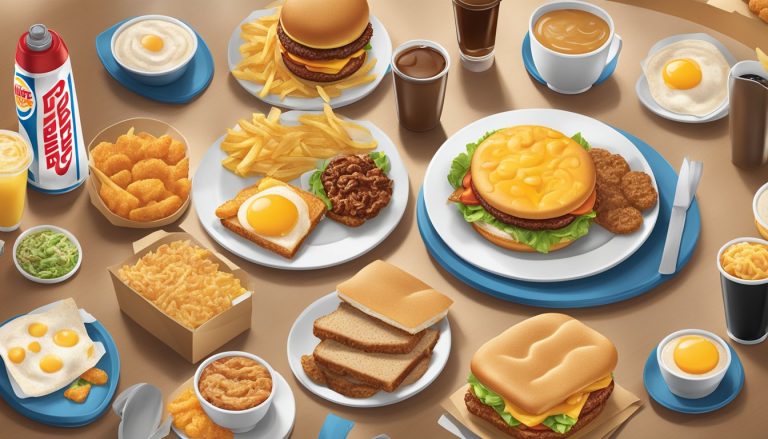Burger King offers a variety of breakfast options for those seeking a quick morning meal. While fast food breakfasts often get a bad reputation for being unhealthy, there are ways to make smarter choices at the drive-thru. By making a few simple adjustments to your order, you can enjoy a more nutritious start to your day without sacrificing convenience or taste.
This article explores five strategies to improve the nutritional value of your Burger King breakfast. From selecting lower-calorie menu items to customizing your order, these tips can help you navigate the menu and make choices that align with your health goals. Whether you’re a regular BK customer or an occasional visitor, these suggestions can empower you to make more informed decisions about your morning meal.
1) Opt for the Egg White & Turkey Sausage Muffin
The Egg White & Turkey Sausage Muffin is a healthier alternative to traditional breakfast sandwiches at Burger King. This option reduces calorie and fat intake while still providing a satisfying meal.
Egg whites are naturally low in calories and fat, yet high in protein. They offer a lean source of nutrients to start the day. Turkey sausage contains less fat than pork sausage, making it a smarter choice for those watching their diet.
The combination of egg whites and turkey sausage creates a protein-rich breakfast that can help keep diners full until lunchtime. Protein is essential for muscle maintenance and growth, as well as overall body function.
This muffin option also typically includes cheese for added flavor and calcium. The English muffin provides complex carbohydrates for sustained energy throughout the morning. By choosing this menu item, customers can enjoy a tasty breakfast while making a more health-conscious decision.
2) Choose oatmeal instead of hash browns

Opting for oatmeal instead of hash browns can significantly improve the nutritional value of your Burger King breakfast. Oatmeal provides more fiber, vitamins, and minerals compared to fried potatoes.
Steel cut oats are an excellent choice, offering a nubby texture and higher nutritional content than rolled oats. They contain more protein and fiber, helping you feel fuller for longer.
To enhance the flavor of your oatmeal, consider adding fresh fruits, nuts, or seeds. These toppings introduce extra nutrients and create a more satisfying meal.
Oatmeal can be customized to suit different tastes. Try mixing in a small amount of honey or maple syrup for sweetness, or add a sprinkle of cinnamon for a warm, comforting flavor.
Preparing oatmeal at home before visiting Burger King allows for greater control over ingredients and portion sizes. This approach ensures a healthier start to your day while still enjoying the convenience of fast food.
3) Add a side of apple slices

Apple slices are an excellent addition to a Burger King breakfast. They provide a nutritious boost of fiber, vitamins, and antioxidants to start the day.
Choosing apple slices instead of hash browns can significantly reduce calorie and fat intake. A side of apple slices typically contains around 30-35 calories, compared to hash browns which have over 250 calories.
Apples offer natural sweetness without added sugars. They can help satisfy cravings for something sweet in a healthier way than syrupy pancakes or sugary muffins.
The fiber in apples aids digestion and promotes feelings of fullness. This may help prevent overeating later in the day.
Pairing apple slices with protein-rich breakfast items creates a more balanced meal. The combination of protein and fiber can provide sustained energy throughout the morning.
4) Select low-fat milk with your coffee

Choosing the right milk for your coffee can make a significant difference in your breakfast’s nutritional profile. Low-fat milk offers a healthier alternative to full-fat options or sugary creamers.
Low-fat milk provides essential nutrients like calcium and protein while reducing calorie and fat intake. It maintains a creamy texture in coffee without adding excessive calories.
For those seeking plant-based options, unsweetened almond or oat milk can be excellent low-calorie choices. These alternatives often contain fewer calories than dairy milk and can complement coffee flavors well.
When ordering at BK, request low-fat or skim milk instead of cream or whole milk. This simple swap can save calories and fat without sacrificing taste.
Remember that even small changes in daily habits can lead to significant health benefits over time. Opting for low-fat milk in your coffee is an easy step towards a more balanced breakfast.
5) Request whole grain options when available

Whole grain options can significantly boost the nutritional value of a Burger King breakfast. These choices provide more fiber, vitamins, and minerals compared to their refined counterparts.
When ordering at Burger King, ask if whole grain alternatives are available for buns, muffins, or wraps. Some locations may offer whole wheat English muffins or whole grain bread options.
Opting for whole grains can help stabilize blood sugar levels and promote feelings of fullness. This can lead to better appetite control throughout the day.
Whole grains also contribute to heart health by potentially reducing the risk of cardiovascular disease. They contain beneficial compounds like antioxidants and phytochemicals.
If whole grain options are not available, consider removing one half of the bun or muffin to reduce refined carbohydrate intake. This simple step can make a breakfast sandwich slightly healthier.
Understanding BK Breakfast Ingredients

Burger King’s breakfast menu contains a variety of ingredients that affect its nutritional profile. Key components include eggs, meats, cheese, breads, and condiments.
Nutritional Content Analysis
Burger King breakfast items vary widely in calorie and nutrient content. The Egg and Cheese Croissan’wich contains around 300 calories, 15g fat, 13g protein, and 29g carbohydrates. Biscuit sandwiches tend to be higher in calories and fat.
Ham, sausage, and bacon add protein but also increase sodium and saturated fat. Cheese contributes calcium and protein along with additional fat. Eggs provide high-quality protein and essential nutrients.
Breads like croissants and biscuits are major sources of carbohydrates and calories. Hashbrowns add extra carbs and fat. Condiments like mayonnaise or sauces can significantly increase calorie and fat content.
Common Additives and Preservatives
Burger King uses various additives and preservatives in its breakfast items. Sodium phosphates help retain moisture in meats. Potassium sorbate acts as a preservative in sauces and dressings.
Dough conditioners like calcium sulfate and enzymes improve texture in breads. Artificial flavors may be present in certain items. Propylene glycol alginate serves as a stabilizer in some sauces.
BHT (butylated hydroxytoluene) is used to preserve freshness in some products. Calcium disodium EDTA helps maintain flavor and appearance. While these additives are FDA-approved, some consumers prefer to minimize intake of artificial ingredients.
Healthy Modifications at BK

Burger King’s breakfast menu can be customized to create more nutritious meals. Strategic ingredient swaps and thoughtful ordering choices allow health-conscious diners to enjoy satisfying options with improved nutritional profiles.
Customizing Your Order
When ordering at Burger King, request modifications to standard menu items. Ask for egg whites instead of whole eggs to reduce cholesterol and calories. Choose whole wheat bread or English muffins over croissants or biscuits for added fiber. Request extra vegetables like tomatoes or spinach to boost nutrient content.
Opt for grilled items rather than fried options. Skip cheese or request a reduced amount to lower fat and sodium intake. Ask for sauces and dressings on the side to control portions. Consider ordering a kids’ meal for built-in portion control.
Ingredient Substitutions
Replace high-calorie sides with healthier alternatives. Swap hash browns for apple slices or a side salad. Choose unsweetened iced tea, water, or black coffee instead of sugary sodas or fruit juices.
For protein, select leaner options like turkey sausage or Canadian bacon over regular sausage or bacon. Replace mayonnaise with mustard or avocado for heart-healthy fats. Substitute Greek yogurt for sour cream to increase protein while reducing fat content.




